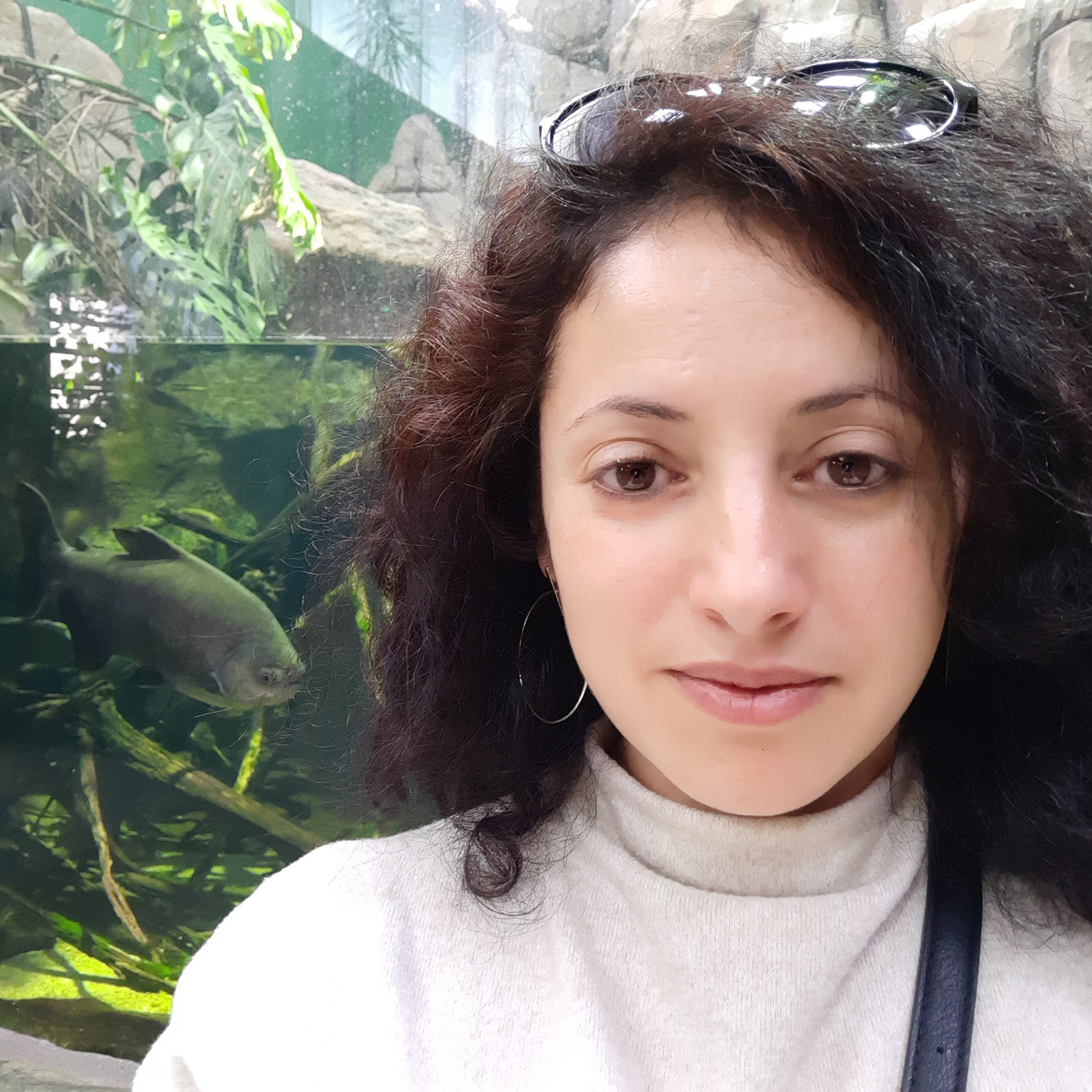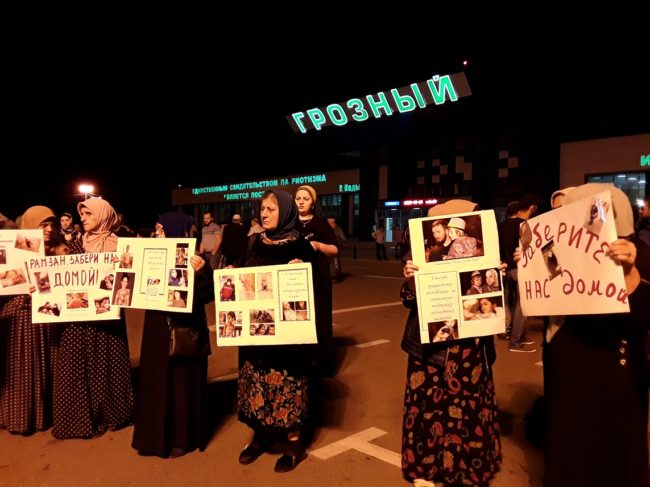
 Four women and eight children arrived in Grozny on the evening of 1 September from the Iraqi city of Mosul. They were returning from Syria, where they had traveled with their husbands to join the Islamic State. Together with their relatives, OC Media’s special correspondent was waiting for them in the airport.
Four women and eight children arrived in Grozny on the evening of 1 September from the Iraqi city of Mosul. They were returning from Syria, where they had traveled with their husbands to join the Islamic State. Together with their relatives, OC Media’s special correspondent was waiting for them in the airport.
Travelling on the flight from Mosul were three women from Russia and one from Kazakhstan, all with small children aged between eight months and nine years. This was the first flight on which the returnees included not only children, but also adults.
Russian citizen Iman Muzayeva is 25 years old. She was born and grew up in Kazakhstan but married five years ago in Chechnya. Iman departed to Iraq with her husband and child in 2014. Her mother Roza Anayeva told OC Media that after the wedding, her daughter started wearing a hijab. Two years later, Iman, her husband and their one-year-old son went to Syria.
In Syria, Iman and her husband had two more sons. She wanted to return home but her husband did not allow her to, and burned her documents. After the death of her husband, she found herself in a camp in the Iraqi city of Tal Afar.
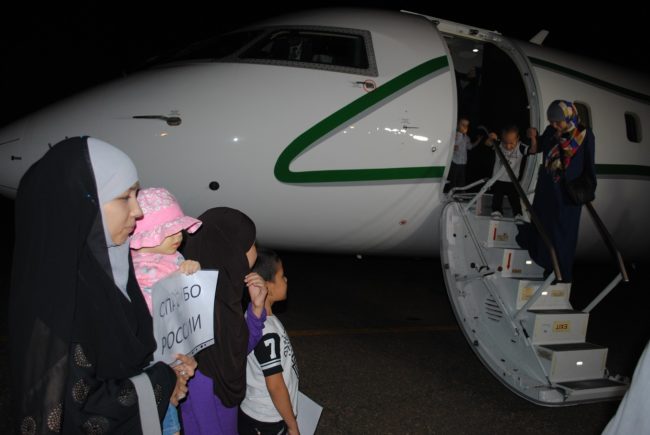
A camp for the families of dead militants
‘We almost always kept in touch. But a year ago, Iman’s husband died, she was transferred to some camp, and communication between us ceased. On 14 May, she got in touch asking to get her out of there. We immediately started sending inquiries to Moscow, the Foreign Ministry, consuls, and to [Head of Chechnya] Ramzan Kadyrov. Iman said that there were no Chechen families kept with her [in the camp], but there were women: Kazakhs, Uzbeks, Tajiks’, says her mother Roza.
Iman told OC Media that the camp she was kept in was designed for the widows and children of slain militants, who were prevented from communicating with anyone. They were also forbidden from leaving the camp. ‘They followed us, were checking our phones’, Iman said.
For the two other women who arrived from Syria, the office of the Commissioner for Children's Rights of Russia will take care of their children. Yulia’s daughter from Nizhnevartovsk and the son of a young woman from Tver, who refused to give her name, will be examined in Moscow.
The latter does not want to talk to journalists and hid her face from the cameras. ‘My elderly mother is waiting at home. She does not know what has happened to me’, she said.
The fourth woman who arrived from Syria is Gulshat, a citizen of Kazakhstan. She and her three children were met in Moscow by representatives of the Kazakh Embassy in Moscow.
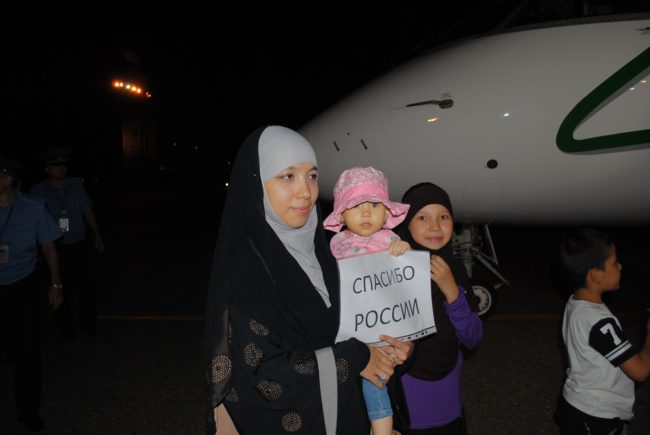
‘Mum, don’t ask’
Relatives of several people who have not yet returned from Syria and Iraq also came to the airport. Upon commencement of the press conference, the women immediately surrounded Ziyad Sabsabi — Deputy Chairman of the Federation Council Committee on Foreign Affairs of the Chechen Republic. He is directly involved in the rescue operations, which is why the women tried to find out if he knew anything about the fate of their children or grandchildren.
Medni Abubakarova is one such woman. Her daughter Tamila left to Syria from France three years ago with her husband and two children. Last year, Tamila’s husband was killed. Three months after his death, she gave birth to a third child.
‘She never told me she wanted to come home. When her husband was killed she said that his last words were: ‘don’t leave’. I still asked when they would come, and one day she wrote to me: ‘Mum, don’t ask. Our Muslim brothers read these messages, and they do not like them’, the distressed mother recalls.
The parents of Tamila’s husband are also waiting for their daughter-in-law and grandchildren. They have a house ready for them in Chechnya. But it has already been half a year since Tamila’s last contact: her fate is now unknown.
Gulya Kazbekova also came to the airport looking for her 22-year-old daughter, who left Daghestan for Mosul a year and a half ago. According to Gulya, like many others, her daughter put on the hijab after marrying, and then left, despite the threat of miscarriage while in her fifth month of pregnancy.
‘My daughter and son-in-law were always in touch. In Mosul, she gave birth, posted pictures of the child. She said that they were all right. I don’t know, maybe her husband was watching. And in February, our contact ceased. For six months now, I don’t know where they are and what’s going on’, Kazbekova said.
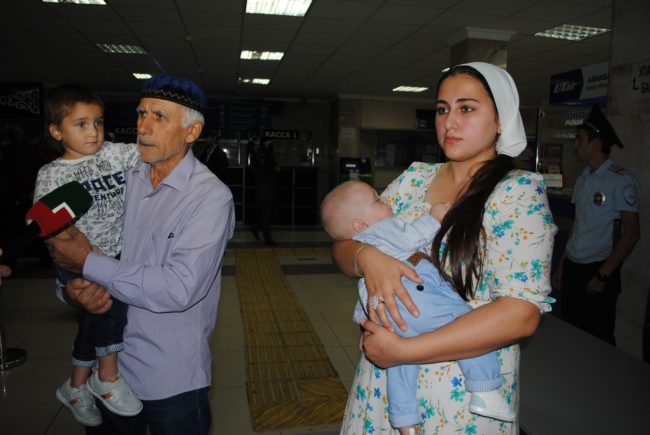
Russians in Syria
It’s difficult to say exactly how many Russians went to fight in Syria. In June this year, Dmitry Feoktistov — Deputy Director of the Department for New Challenges and Threats of the Russian Foreign Ministry — told reporters in New York that since the beginning of 2017, five people had left for Syria.
In April, Secretary of the Russian Security Council Nikolai Patrushev said that almost 2,700 people from the North Caucasus had joined the Islamic State.
According to Anna Kuznetsova, the Presidential Children’s Rights Commissioner, about 350 children from Chechnya and Daghestan have been taken by their parents to Syria or Iraq. ‘There are more than 200 names on the list of children from Daghestan, and this is only official data’, Kuznetsova said.
On 25 August, a flight landed in Grozny carrying five Daghestani children from Mosul. After learning of this, some Daghestanis turned to human rights activists from Chechnya for help.
On 1 September, Kuznetsova announced that a unified database will be created to keep track of all children from Russia who have been taken to the Middle East by parents joining terrorist groups.
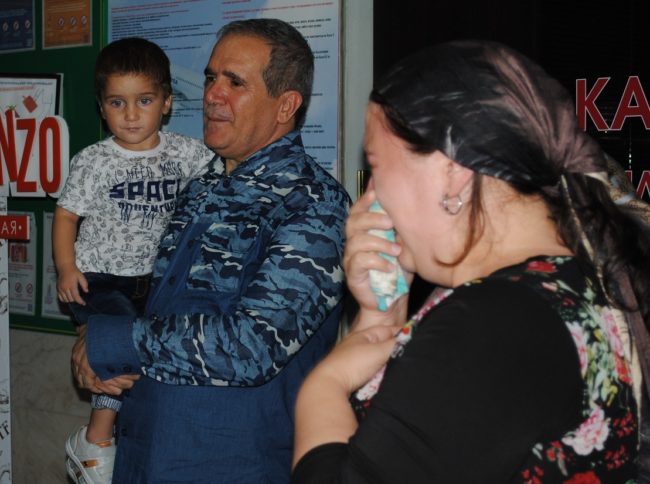
A difficult way home
According to a member of the Human Rights Council of Chechnya, Kheda Saratova, local human rights activists receive requests for help in finding relatives in Syria and Iraq from many regions of Russia: Daghestan, Ingushetia, Kabardino-Balkaria, and from such Russian cities as Sochi, Moscow, St Petersburg, and Penza. She says the list of people they are searching for includes 148 people, among whom there are as many as 60 children. Such lists are sent to the Russian consulate in Iraq and personally to Committee on Foreign Affairs deputy chair Ziyad Sabsabi.
Saratova told OC Media that a huge wave of appeals to the Human Rights Council began after the return of the five Daghestani children.
‘These children need help. They are not to blame for the fact they were thrown in there, that their parents were so crazy. Many of the parents only think about becoming martyrs, and do not care about what happens to their families and children’, says Saratova.
According her, the Council is in constant contact with the relatives of those who are still in Syria or Iraq. and when relatives receive news from their children, they immediately share them with human rights activists.
‘A young woman recently sent an audio message to her father: “Pray for us, today we will depart to the next world”. It seems that they were bombed, because one could hear how everyone cried. And recently a Daghestani addressed me: “Kheda, help me. We are being bombed. I have two girls with me” ’, she shares.
Saratova notes that it is easier to help once people contact them, as they no longer need to be searched for. But nothing is known about many others. In addition, the search is also exacerbated by conditions in the region.
‘The main difficulty is that we have to work in the conflict zone. In addition, only a couple of people are involved in it — Sabsabi and the Russian consul in Erbil, Yevgeny Arzhantsev. Although, in my opinion, all republics should be engaged in this. Had we worked together and coordinated, the result would have been better’, she concludes.




 9 September 2017
9 September 2017
